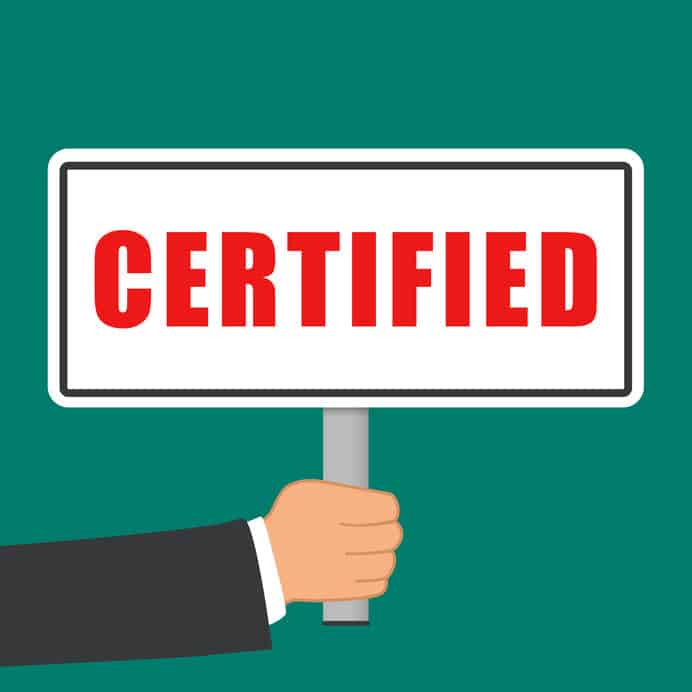Business analysis certification is usually not a mandatory prerequisite to become a business analyst. But, excelling as a business analyst requires an extensive skill set and thorough technical proficiency. The best BA’s have a deep understanding of business processes, technologies and a number of required soft skills. Some competence can be acquired through sheer experience, but an adequate amount of training is necessary for most, and training is best done by attending a certification course.
You can get a free business certification guide here
Table of Contents
Tech and data industry are in the midst of unparalleled growth, and right now there are more jobs available than the individuals qualified to perform them. With more and more companies modernising their structure and adopting a modern business environment, the future looks good for skilled business analysts. The companies know that, when dealing with stakeholders and clients, having a certified business analyst is a testament to the dedication to modern business practices.
Becoming a certified business analyst will validate your knowledge and skills and increase your credibility as an expert in the field. It will give you an edge on a job market and propel your career. Big companies’ head hunters will be more appreciative of your competence if it’s confirmed by a credible and independent source.
Completing the certification is not easy, actually, it’s the opposite. For future employers, it will paint a picture of a dedicated, committed, hard-working person, able to work under pressure. Furthermore, attending the course and passing the exam will help you keep up with the latest tools and techniques, which is essential in a fast-growing and always changing field such as this one.
Why Should I Invest in Certification
The amount of money you’ll need to set aside for certification can vary greatly, depending on the scope of certification and credibility of the institution providing it. But, you shouldn’t view it as money spent, rather consider it an investment in yourself and in your career. Not to mention that it provides increased job security, a vital factor in today’s competitive job market.
The attractive salary of a business analyst is not always the main reason for choosing this career path, but there is no denying that it plays a large part. The average BA’s yearly salary at entry level starts at about $67,000 and it only rises with seniority. And, of course, one of the most common routes to seniority and advanced analyst positions is acquiring certification.
Holders of the top 5 certifications (which we’ll discuss later) have seen a 20 to 40% increase in their salaries. Their average salary is at around $85,000, depending on the industry and the part of the world. The return on investment is clear and measurable, with a direct connection between investing in business analysis certification and the amount on your future paycheques.
Besides financial perks, there are other benefits if you choose to become a certified business analyst. Taking part in certification group training and preparing for the exam with your peers help you build an extensive network throughout the industry. You’ll get a chance to interact with and learn from industry experts. Developing a network of your peers can help you with job hunting and also provide a reliable group of like-minded experts that you can lean on during a specific project.
Becoming certified opens up a whole new world of potential opportunities. Nowadays, business and data analysis are used in just about every branch of industry. From finance to automotive, from healthcare to entertainment. Business analysis certification will equip you with skills to succeed in any of these industries and give you a chance to do a little picking choosing, selecting the area of business and the type of organisation that interests you the most. It also expands the range of potential positions within the company that you’ll be able to fill and perform with competence. Likewise, the certification will open the door work on to the more complex projects and step up to new challenges.

How to Become a Certified Business Analyst
As mentioned above, becoming a certified business analyst bring many potential benefits. But, for some, the certification itself can be a daunting and complicated process. First of all, you need to choose a suitable certification program and an appropriate level of certification. To select the right program, you need to be aware of your current level of knowledge and expertise and have a clear plan for the future.
Properly asses your skillset and experience as a business analyst so far. Take into account your employment status and role in the current organisation. Determine your goals for the future, both regarding salary and self-improvement. Conduct thorough research of available programs and levels.
There are 5 major institutions that offer business analyst certification programs that are widely considered as the most credible and whose certificate carry the most weight in the industry:
- International Institute of Business Analysis (IIBA)
- British Computer Society (BCS)
- Project Management Institute (PMI)
- International Qualification Board for Business Analysis (IQBBA)
- International Requirements Engineering Board (IREB)
We’ll go through all of them and look closer into their certifications, requirements, eligibility, and the process of becoming certified.
International Institute of Business Analysis (IIBA)
IIBA is a non-profit international association dedicated to promotion and maintaining standards of business analysis. It is behind the BABOK (A Guide to the Business Analysis Body of Knowledge), a comprehensive overview of BA knowledge and practices. As a big part of its activity, IIBA offers formal certifications to become a certified business analyst with the IIBA. We’ll take a closer look at their core certifications.
IIBA Entry Certificate in Business Analysis (ECBA)
What is the ECBA?
Entry Certificate in Business Analysis is an entry-level IIBA certificate, specifically created for novice business analysts, It follows the BABOK guide and covers the basic knowledge on approaching the business analysis. Obtaining ECBA proves that you have the core knowledge and understanding of BA processes and tools. More than anything else, it provides a solid foundation for deeper dive into business analysis techniques.
Among others, the ECBA exam covers the following knowledge areas: BA key concepts, underlying competencies, BA techniques, BA planning and monitoring, requirements life cycle management, elicitation and collaboration, strategy analysis, requirements analysis, and solution evaluation. All of these areas are further divided into competencies and behaviours of the ECBA certificate holder. ECBA certified analyst understands the key concepts of BA competency and is able to follow prescribed rules.
Who Should do the ECBA?
ECBA is mostly intended for entry-level BA’s trying to expand their knowledge, professionals from other areas looking for a career change, and fresh graduates interested in the career in the business analysis field.
How to Become ECBA Certified?
After you fulfilled the eligibility criteria, all that is left is passing the exam. Although less demanding than exams at higher levels, ECBA certification still requires a serious approach and hard work. The exam consists of 50 multiple choice questions with four possible answers, of which only one is correct.
If you are new to the field, make sure you understand the key concepts of business analysis. Try to keep up-to-date with all the latest software and technology developments. The first 25% of the exam covers the BA basics. The other 75% are related to BABOK guide knowledge areas.
Make sure to read the guide and understand it as much as possible, especially areas that are a part of the exam. If you are having trouble grasping the concepts and techniques, try joining ECBA certification training. IIBA recognises numerous Endorsed Education Providers (EEPs) all over the world. When you feel sufficiently theoretically prepared, you may want to take some mock tests. Try some knowledge area tests first, before taking the full test. When you’ve repeatedly passed the mock tests with 80% or higher, you may consider yourself ready for the real thing.
The cost of ECBA certification is exam fee members ($195), non-members ($350), corporate members ($150).
IIBA Certification of Competency in Business Analysis (CCBA)
What is the CCBA?
CCBA is the second level of IIBA certification, designed for candidates with at least two years of experience in business analysis. The holder of CCBA certificate is able to work effectively with the stakeholders, capable of identification and evaluation of opportunities for better business results and competent in modelling the business processes, CCBA certified business analysis is ready to not just follow, but modify rules in order to achieve desired goals.
He is adept at independent work on the smaller scale projects, while still relying on expert guidance for more complex challenges. They have been involved and applied their knowledge in real-life scenarios during business processes. CCBA certification covers competencies as grouped in six BABOK knowledge areas: business analysis planning and monitoring, elicitation and collaboration, requirements life cycle management, strategy analysis, requirements analysis and design definition, and solution evaluation.
Who Should do the CCBA?
CCBA certificate is for those looking to push forward their careers and take their competence to the next level by improving their knowledge and skills. This includes candidates already holding ECBA certificate, non-BA consultants, product managers, trainers, testers, QA professionals, designers, and transformation managers.
It is important that the candidates have diverse business analysis experience. It’s perfect for those still leveraging their BA skills working towards gaining more expertise. To be eligible for the certificate you need to have a minimum of 3.750 hours of verifiable business analysis experience in the previous 7 years (with 900 hours in each of 2 of 6 BABOK knowledge areas, or 500 hours in each of 4 of 6 BABOK knowledge areas). You also need to meet the condition of 21 hours of professional development (as with ECBA) and provide references.
How to Become CCBA Certified?
CCBA exam consists of 130 scenario-based multiple-choice questions. To pass, you’ll need to master all the relevant BABOK knowledge areas. If needed go through it a couple of times to make sure you understand all of the concepts. Imagine the BABOK guide as your bible for the CCBA exam. If needed look for the help of EEPs, to better structure your training and provide a better grasp of the material.
This may also provide the needed professional development units. Do as many practice exams as you can, to gain a better awareness of the exam structure and get more familiar with possible scenarios in the actual exam. If you have any difficulties, try joining business analysis community forums and reach out to experienced professionals.
The cost of CCBA certification is $145 application fee, exam fee members ($250), non-member ($405), corporate member ($205).
IIBA Certified Business Analysis Professional (CBAP)
What is the CBAP?
CBAP is a level-3 IIBA certificate which serves as evidence of extensive business analysis experience and competence. Holders of this certificate are leaders in the BA community. It demonstrates the possession of skills needed for senior business analysis positions within the organisation. CBAP certified business analyst is capable of creating new rules when faced with new challenges and provides expertise inside and outside of their domain. They are looked upon for guidance and expertise in handling complex problems.
Their knowledge and experience gained through the years of practice are useful and applicable to all sorts of projects ranging from those small in scope to those more complicated and unstructured. CBAP certification covers the expert level of competencies as grouped in six BABOK knowledge areas: business analysis planning and monitoring, elicitation and collaboration, requirements life cycle management, strategy analysis, requirements analysis and design definition, and solution evaluation.
Who Should do the CBAP?
CBAP is the most respected and sought-after certificate in the industry. Potential candidates for CBAP certification are professionals with extensive experience in the BA field, analysts already holding CCBA, non-BA consultants, product managers, trainers, testers, QA professionals, designers, and transformation managers.
To complete CBAP certification candidates must have at least 7.500 verifiable hours of experience in business analysis in the last 10 years (with 900 hours in each of 4 of 6 BABOK knowledge areas, totalling for a minimum of 3600 of the required 7.500 hours), 21 hours of professional development in the past 4 years and provide at least 2 references.
How to Become CBAP Certified?
CBAP exam lasts 3.5 hours and consists of 120 multiple-choice questions. Having a full understanding of the BABOK guide goes without saying. It will give you a solid framework for further learning. Read at least a couple of books from the BA field.
There are a couple of helpful books designed specifically to help you prepare for the CBAP certification exam, namely CBAP Certification Study Guide v3.0, CBAP Certification and BABOK Study Guide, and CBAP/CCPA Certified Business Analysis Study Guide. If you are having trouble studying by yourself attend one of the EEP training courses and seek advice from more experienced BA professionals. Find exam simulators and practice tests and go through as many as possible. Review all the guides and sample questions on IIBA’s CBAP site. Draw as much as you can from your real-life experiences and business challenges that you’ve faced.
The cost of CBAP is application fee $145. Exam fee member ($350), non-member ($505), corporate member ($305).

British Computer Society (BCS)
BCS is an organisation dedicated to education and development in the digital world. Their business analysis certification is a guarantee of excellence and competence in the field and provides an excellent tool in propelling your BA career. They are behind an extensive global network of examiners and trainers that ensure the highest standard for various levels of experience. A business analyst can become a certified business analyst with the BCS.
BCS Foundation Certificate in Business Analysis
What is the BCS Foundation Certificate in Business Analysis?
BCS’s Foundation Certificate is the entry-level certificate intended for BA freshers as the first step in their career. It’s helpful in gaining an understanding of how to improve business processes, recognise and evaluate possible options in problem-solving and further develop skills and knowledge necessary to be a successful business analyst.
The certificate covers a range of BA subject matter including the role and responsibilities of the analyst, investigation techniques – interviewing, observing, and prototyping, managing and analysing stakeholders, developing business metrics, modelling of a business process, assessing feasibility, producing business and financial use cases, and establishing requirements.
Who Should do BCS Foundation Certificate in Business Analysis Certification?
This certificate is suitable for all professionals who require solid background knowledge of business analysis, especially junior-level analysts, system developers. business managers, and their team members, and transformation and project managers. This certificate is a great starting point for recent graduates or professionals seeking to make a career shift. Since there are no entry requirements, the certificate can be acquired by anyone willing to gain a broad understanding of business analysis practices,
How to Become Certified?
BCS Foundation Certificate in Business Analysis exam consists of 40 multiple-choice questions. To pass the exam you need to have 65% of correct answers. The best way to prepare for the exam is to take a training course at one of the many BCS approved training providers. You can attend training almost anywhere in the world, and there are also e-courses available.
Courses usually last for three days or 27 hours. If you feel that you already have enough understanding to study on your own, seek one of the preparation books, such as the 3rd edition of Business Analysis. It covers the syllabus for the exam and provides extensive information on BA techniques and approaches.
The price of the exam is £192 or $242. The cost of a training course depends on a chosen provider and a part of the world where you are attending.
BCS International Diploma in Business Analysis
What is the BCS International Diploma in Business Analysis?
Attaining the BCS International Diploma in Business analysis is a great way to have your BA knowledge and skills validated and internationally recognised. The exam is divided into modules of which you need to pass at least four. The certificate validates the basic BA knowledge, understanding of business management and behaviour, and practical BA skills. The advantage of this certificate is its flexibility, it provides an opportunity to develop skills and gain knowledge most relevant to you and you’re particular organisation.
Who Should do the BCS International Diploma in Business Analysis Certification
The BCS International Diploma in Business Analysis is mainly for professionals who already have some experience in business analysis. This may include systems analysts, project managers, requirements engineers, product managers, business architects, product owners, and management consultants. The certificate demonstrates they have a firm grasp on BA techniques, tools and practices.
How to Become Certified?
In order to attain the certificate, you need to pass the 4 exam modules and oral examination. There are 2 mandatory core modules: Business Analysis Practice and Requirements Engineering. You need to also pass one of these 5 knowledge-based modules: Business analysis Foundation, Business Change, IS Project Management, Organisational Behaviour, and Commercial Awareness.
This written part of the exam is completed when you pass one of these 5 practitioner modules: Modelling Business Process, System Modelling Techniques, Systems Development Essentials, Data Management Essentials, and Benefits Management and Business Acceptance. After successfully finishing this part, you can book the oral exam at one of the BCS centres. Training courses with BSC approved providers usually take 3 days and you can choose which modules to focus on.
The price of the exam is £390 or $492. The cost of a training course depends on a chosen provider and a part of the world where you are attending.
BCS Advanced International Diploma in Business Analysis
What is the BCS Advanced International Diploma in Business Analysis?
This certificate demonstrates skills and competence beyond those covered by the standard BCS international diploma. It guarantees senior-level BA experience and is recognised industry-wide and all over the world. Successful candidates, besides expertise, actively promote and contribute to the business analysis community. It is a logical next step for senior and experienced analysts.
Who Should do the BCS Advanced International Diploma in Business Analysis Certification?
This certification is intended for business analysts that are further up the career ladder and already boast significant expertise and experience. The advanced diploma enables you to follow the usual career route for BA’s – from Senior-level analyst, over Lead to the Practice Manager. In order to be eligible for the advanced diploma, the candidates must already hold the BCS International Diploma in Business Analysis, BCS professional BA certificate in each of the required groups off skills and the same certificate in either analytical or business skills specialism.
How to Become Certified?
The skills specialisms required for the diploma are divided into three groups. Analytical – Business Architecture, Advanced Requirements Engineering, Data Analysis, and Agile Business Analysis; Business – Business Finance and Benefits Planning and Realisation; and, finally, People skills – Stakeholder Engagement and Team Leadership. In addition, you must have at least 5 years of relevant business analysis experience at the senior level. The application should include practical examples of BA implementation.
Also, the candidate needs to demonstrate initiative and activity in contribution to a wider BA community. Besides, at least one reference, usually from a senior colleague, is needed. After you’ve fulfilled all of the necessary requirements, your portfolio will go under a thorough review to confirm that the information you submitted is correct. You may be awarded the diploma based on your portfolio alone, or you and your reference provider may be invited for further discussion.
The application fee is £714 or $900.
BCS Expert BA Award
What is the BCS Expert BA Award?
The BCS designed the Expert BA Award in partnership with Chartered Management Institute and Business Analysis Manager Forum to reward and recognise the higher level of competence. and capability. The emphasis is on the candidates’ ability to in the area of complex business analysis, stakeholder management, mentoring and coaching and strategic improvement of the organisation.
Who Should do BCS Expert Award Certification?
Suitable candidates for the BCS Expert Award are senior and high-level analysts and leaders, with an exquisite body of work behind them, looking for formal recognition of their competence and skill level. This certification is not only rewards and individual but is a benchmark for the whole organisation’s dedication to excellence and proper staff management.
How to Become Certified?
To be eligible for this certificate, a candidate must provide prerequisite certifications and evidence of special and core skills. After that, their submission is assessed and, if deemed suitable, a candidate is assigned a project. Successful competition of the project assignment leads to the interview upon which the decision on granting an award is made. BSC Expert Award is subject to recertification, which means that in order to retain the certification, the candidate must continue professional development.

Project Management Institute (PMI)
Project Management Institute is a worldwide non-profit organisation dedicated to project management. Besides developing standards, education, and research, one of its core activities is issuing certificates, among others, for excellence and competence in business analysis. A business analyst can become a certified business analyst with the PMI.
PMI Professional in Business Analysis (PMI-PBA)
What is PMI Professional in Business Analysis (PMI-PBA) Certificate?
PMI-PBA certificate recognises individual competence and expertise in all aspects of business analysis. It demonstrates the expert use of tools and techniques from requirements management to solution evaluation. PMI-PBA is credible globally and held in high regard by hiring managers in the world’s leading companies. Being a holder of PMI’s certificate means that you can be trusted with the most significant and complex projects.
Who Should do PMI-PBA Certification?
Potential candidates for PMI Professional in Business Analysis certificate are already experienced professionals in the requirements or product development field, usually project or program managers. You are eligible for a PMI-PBA certificate even if you have only a secondary education degree. In that case, you need to have 7.500 hours of verifiable experience in business analysis and 35 contact hours of education. If you hold a bachelor’s degree or an equivalent, to apply you need 4.500 hours of experience, and also 35 hours of contact education.
How to Become PMI-PBA Certified?
Earning PMI-PBA certification takes real effort. the whole application process takes 90 days. Once your application documents have been reviewed and fee paid, you can schedule your exam. PMI-PBA exam consists of 200 multiple-choice questions. Prior to a 4-hour long exam, you can go through an optional tutorial.
The exam covers 40 knowledge and skill areas relevant to business analysis. The exam questions are divided into 5 business analysis domains: Need Assessment (5 tasks), Planning (6 tasks), Analysis (8 tasks), Traceability and Monitoring (5 tasks), and Evaluation (4 tasks).
Besides the overall score, each domain is given a rating demonstrating proficiency level in the relevant domain. There are 4 ratings: Above Target, Target, Below Target and Needs Improvement. PMI-PBA is subject to recertification every three years since you’ve passed the exam. Certificate holders must have at all times at least 60 professional development units (PDUs). The maximum for one category is 45 units, so you’ll need to expand your knowledge in order to keep the certificate.

International Qualification Board for Business Analysis (IQBBA)
International Qualification Board for Business Analysis is an international body dedicated to developing standards in the field of business analysis and issuing certificates for the best practitioners. At the moment the basic level standard is available, while two advanced levels will be introduced in the near future.Project Management Institute is a worldwide non-profit organisation dedicated to project management. Besides developing standards, education, and research, one of its core activities is issuing certificates, among others, for excellence and competence in business analysis. A business analyst can become a certified business analyst with the IQBBA.
IQBBA Certified Foundation Level Business Analyst (CFLBA)
What is the IQBBA Certified Foundation Level Business Analyst (CFLBA) Certification?
CFLBA certification is a program covering the basics of business analysis and requirements engineering. Obtaining the certificate means that you have a foundational understanding of the key BA concepts: process modelling and improving, requirements collection and analysis, designing business solutions, and innovation.
The main focus is on the most commonly used BA standards and rules. CFLBA holder knows how to elicit requirements from users and document them, how to explore requirements together with the development team and how to conduct proper testing.
Who Should do the CFLBA Certification?
CFLBA certification is intended for entry-level candidates with a basic understanding of business analysis, requirements and solution concepts, design, and development, The main target are Product Owners, Product Managers, Business Analysts, System analysts, and Requirements Engineers and other individuals interested in further developing knowledge and skills related to the business analysis.
How to Become CFLBA Certified?
The CFLBA certification exam consists of 40 multiple-choice questions and takes 60 minutes. The exam is based on IQBBA approved curriculum and the learning objectives of the curriculum define the areas covered by the exam. These objectives are BA fundamentals, enterprise analysis, BA process planning, requirements elicitation, requirements analysis, solution validation, tools and techniques, competencies, process improvement, and innovation. IQBBA syllabus is a great resource for exam preparation.
Additionally, you can turn to one of the numerous accredited training programs. They have proven to be very helpful especially for those with less experience in the field and slower to understand the basic concepts.
The cost of CFLBA certification is $250
Certified Advanced Level Business Analyst (CALBA)
What is the Certified Advanced Level Business Analyst (CALBA) Certification?
As we mentioned above, IQBBA’s advanced level of certification is not yet available, but some information is already known. It will serve to further improve skills acquired at the foundational level. There are three core modules of the advanced level: Strategic Analysis and Optimisation, Business Analysis Management, and Requirement Engineering and Management.
The first module deals with tools and techniques used to determine business objectives within the organisation, understand the current needs, identify the change, and prepare potential solutions. Business Analysis Management covers the approaches and skills needed to conduct business analysis activities in a specific business environment. Requirements Engineering and Management includes requirements elicitation processes, negotiation, analysis, and, also, information architecture, QA, configuration management, and traceability.
Who Should do the CALBA Certification?
IQBBA’s CALBA certification will be geared mostly towards holders of CFLBA certification and individuals with some experience and understanding of business analysis, strategy, and requirements.
How to Become CALBA Certified?
Each module of CALBA certification will be the basis for the exam in the specific specialisation. The exam itself will have multiple-choice questions structure. You will be able to take the exam with or without a previously conducted training course with one of the accredited providers.
Certified Expert Level Business Analyst (CELBA)
At this moment, IQBBA’s CELBA certification information is rather scarce, so watch this space for future updates.

International Requirements Engineering Board (IREB)
The International Requirements Engineering Board, founded and based in Germany, is a provider of the global three-level certification scheme Certified Professional for Requirements Engineering (CPRE). their objective is to support a unified and internationally recognised standard for Requirements professionals. They do so by providing and regularly updating syllabus and determining guidelines and for certification. The process is overseen by the IREB Steering Committee composed of Requirements experts from business and academia. IREB’s domain of responsibility is the curriculum and the exams themselves, while the certification is conducted by independent organisations and training courses are provided by the independent providers. There are three levels of IREB certification – foundational, advanced and expert.
Certified Professional for Requirements Engineering (CPRE) – Foundation Level
What is the CPRE – Foundation Level Certificate?
Certified professional for Requirements Engineering certificate at its foundational level provides knowledge and understanding of core concepts of Requirements to those relatively new to the field, With over 10.000 holders in over 35 countries, it is the most popular certification in the field. the program recognises that the reason for failed projects in most cases is unclear and faulty requirements and the scheme is set up in order to rectify this. This certification is something every entry-level Requirements employee should strive for.
The wide scope of the program includes requirements elicitation and proper documentation, validation verification of requirements, and their management through the whole product life cycle. By the time the certification is complete, the candidate should have an understanding of Requirements and business analysis terminology and jargon, have a grasp of basic techniques and tools of Requirements management, and know the most common notations for requirements.
Who Should do the CPRE – Foundation Level Certification?
The main target audience for CPRE certification at the foundational level is entry-level employees in the requirements and business analysis field. These are the individuals who had some experience, but not enough to fully grasp the basic concepts and techniques.
This includes business and system analysts, consultants, developers, system engineers and architects, interface designers, team leaders, project and quality managers, testing specialists, software engineers and managers, and all the other specialists whose positions include the requirements development. Applying for the CPRE foundational certificate requires no particular previous experience or education.
How to Become CPRE Certified at the Foundational Level?
The foundational level CPRE certification exam consists of 45 multiple-choice questions. In order to pass, you need to answer at least 70% of the questions correctly. The exam may be electronic or pen-and-paper based and is proctored. The content for the preparation for the exam is provided by the CPRE.
It includes CPRE FL syllabus, the CPRE glossary and the various books such as Requirements Engineering Fundamentals (part of the official CPRE syllabus), Business Analysis Agility: Solve the Real Problem, Deliver the Real Value, Discover to Deliver: Agile Project panning and Analysis, and Mastering the Requirements Process, among others.
As always, if you are struggling, enrol in one of the CPRE training courses with CPRE accredited providers. These courses are not mandatory but are highly recommendable. They can be taken in person and online. The exam can be taken in test centres or on-site with course providers, administered by an independent certification body. It is important to note that CPRE’s foundational certification overlaps in big part with British Computer Society’s and CPRE certificate holders are exempt from taking the BCS’s certificate exam and vice-versa.
Certified Professional for Requirements Engineering (CPRE) – Advanced Level
What Is the CPRE – Advanced Level Certification?
Certified Professional for Requirements Engineering Advanced Level certificate is mostly geared toward the holders of CPRE’s foundational level certificate. It offers them a chance to expand and deepen their knowledge and add to their set of skills. Having a foundational level certificate is necessary to be able to apply for an advanced level exam.
The focus is on the particular Requirements engineering and business analysis skills. Obtaining an advanced level certificate should equip the candidate with the following skills: familiarity with the terminology and jargon of the field covered by AL modules, mastering the particular skills related to the modules covered bu the AL certificate, sound knowledge of the concepts of specific modules within AL syllabus.
Advanced Level CPRE certification consists of four modules – Requirements elicitation (upgrade on the knowledge acquired at the foundational level), Requirements Modelling (expressing functional requirements with the help of graphic models), Requirements Management (method and techniques for management of requirements throughout the product life cycle), and Re@Agile (applying RE tools and techniques in an agile environment, and the other way around). Since each module has a corresponding exam and certificate, make sure to choose the module according to your interests and needs.
Who Should do the CPRE – Advanced Level Certification?
As we already mentioned, the individuals who have previously obtained foundational level certificates are the first in line when it comes to taking the advanced level exam. This may include employees a bit higher in the hierarchy of the organisation such as Requirements engineers and managers, Project and Development managers, Development engineers, QA managers, System architects, systems engineers, and anyone else whose job requires the understanding of the Requirements. Other than the CPRE foundations level certificate (or its REQB or BCS equivalents) there are no other prerequisites for applying for the exam.
How to Become CPRE Certified at the Advanced Level?
The CPRE advanced level exam consists of two parts – written examination and written assignment. The written examination is a 75-minute test with multiple-choice questions. The structure of this part of the exam is similar to the foundational level.
The second part of the exam, which is to be taken within a year of passing the first test, is a two-day homework assignment, it represents a realistic situation from your business environment and should demonstrate your ability to apply acquired skills to a specific problem. The result of this part should be an original case study, done by the candidate using only stated literature. It should be form10 to 20 A4 pages long and written in English or German.
The first part is considered passed with a score of over 70% while you pass the second part with 60% of the total score. In order to acquire the certification, both parts of the exam must be passed. Success on the written exam is necessary to be able to take up the assignment.
As usual, you can prepare for the exam by studying yourself or by taking part in the training course with accredited providers. The exam can be taken in test centres or on-site with course providers or in the case of a self-study option, you can schedule the exam in one of the test centres.
Certified Professional for Requirements Engineering (CPRE) – Expert Level
What is the CPRE – Expert Level Certification?
The one thing that best explains the Certified Professional for Requirements Engineering Expert Level certificate is that there is no syllabus. CPRE is of the opinion that the expertise and competence at this level can not be imparted through the syllabus or transferred by training. It takes years to achieve this level of excellence in business analysis and requirements management.
A lot of things need to come together, constant self-improvement, frequent exchanges of opinions with your peers – other experts, and continuous questioning of established beliefs, both from the environment and individual ones. this kind of knowledge can come only from hard work and continuous involvement in analysis and requirements created activities.
Who Should do the CPRE -Expert Level Certification?
It’s pretty self-explanatory from the previous paragraph. CPRE Expert Level certification is designed for experienced senior analysts and leaders in the field. These should be the individuals that took part in numerous complex projects, dealt with the unexpected problems and answered the most demanding challenges. It recognises that candidate’s expertise is second to none.
There are certain formal prerequisites for applying, though. The applicant has to hold at least three Advanced Level certifications. Maximum two certificates can be substituted with other documentation (but it needs to have a clear connection to RE), such as university lectures or certificates obtained through other programs – CBAP, BCS… Or, they can be substituted by a significant publication of the candidate’s works. the second condition is participation in the various projects and activities in the role of the Requirements engineer for the equivalent duration of at least three years.
Besides these requirements, the applicant must have experience as a coach or a mentor in the Requirements related field.
How to Become CPRE Certified at the Expert Level?
The expert level CPRE exam consists of three parts. the first part is a written application. It should serve as the evidence that the candidate fulfils all their conditions (mentioned above) to be eligible for the exam. The second part is a written assignment similar in form to the one for an advanced level certificate. Here, the applicant must demonstrate the mastery of skills and techniques and possession of the in-depth know-how required for successfully handling the toughest assignments and the most complex projects in the Requirements engineering field.
The last part is the oral exam. It’s a face-to-face meeting; online or at the test centre. It lasts for 90 minutes and includes three stages. In the first part, the candidate is given a case and after 2-hour preparation has 30 minutes to present their thoughts and suggestions. In the second phase, the applicant is questioned on Requirements Engineering related issues of the given case. And finally, in the last 30-minute part, the candidate answers general Requirements Engineering questions.

